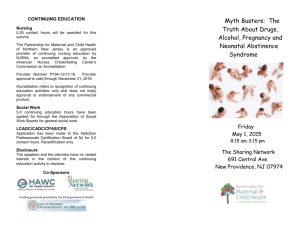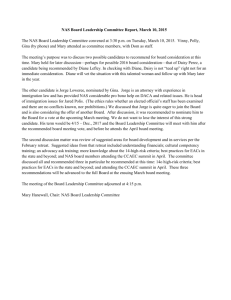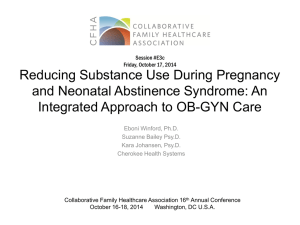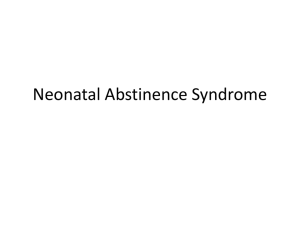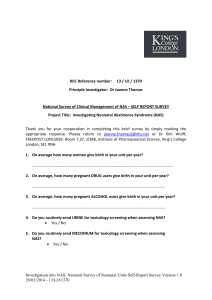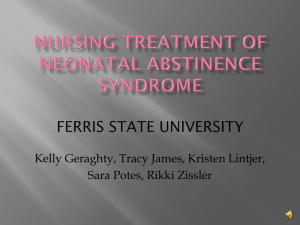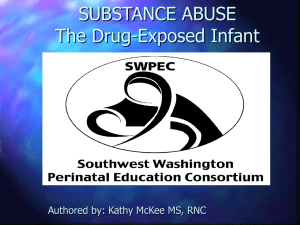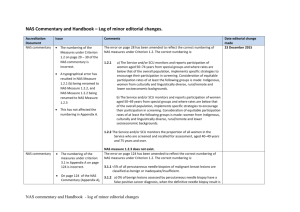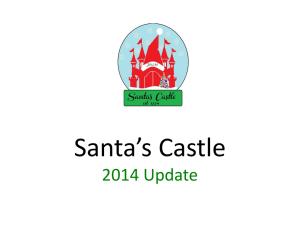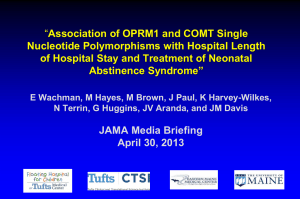E TN Presentation on NAS-LARC
advertisement
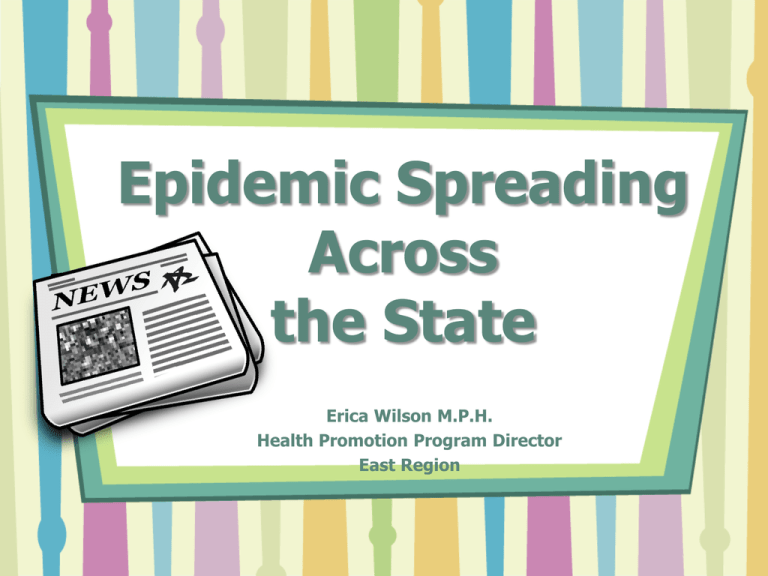
Epidemic Spreading Across the State Erica Wilson M.P.H. Health Promotion Program Director East Region Neonatal Abstinence Syndrome What is it? Neonatal abstinence syndrome (NAS) is a term for a group of problems a baby experiences when withdrawing from exposure to narcotics. What Causes It? Almost every drug passes from the mother's blood stream through the placenta to the fetus. Illicit substances that cause drug dependence and addiction in the mother also cause the fetus to become addicted. What Happens to the Baby? At birth, the baby’s dependence on the substance continues. However, since the drug is no longer available, the baby’s central nervous system becomes overstimulated causing the symptoms of withdrawal. What’s the Incidence of Neonatal Abstinence Syndrome? • 626 cases in Tennessee as of 8/30/14 compared to 564 at same point in 2013 • Increase of 11% Maternal County of Residence by Region August 30, 2014 # Cases % Cases Davidson 31 5.0 East 179 28.6 Hamilton 7 1.1 Jackson/Madison 2 0.3 Knox 70 11.2 Mid-Cumberland 58 9.3 North East 89 14.2 Shelby 27 4.3 South Central 20 3.2 South East 10 1.6 Sullivan 43 6.9 Upper Cumberland 71 11.3 West 19 3.0 Total 626 100.0% • East Tennessee continues to account for largest proportion of cases in the state (28.6%) • 3rd highest rate in the state (35/1000 births) • Exposure source trends in East TN vary from those seen in all cases state-wide Types of Prescription Only Exposures, NAS Cases, East TN Region, Jan. 1 - Aug 30., 2014 4% Replacement Therapy 16% Pain Therapy Psychiatric/Neurologic Therapy 80% Reported Cases of NAS, by County, East TN Region, Jan. 1 - Aug. 30, 2014 45 42 40 35 Number of Cases 30 25 24 20 20 16 15 12 10 5 6 14 14 7 5 5 5 3 4 2 0 County Highest rates based on provisional county birth estimates Why is Neonatal Abstinence Syndrome a Concern? The Baby • Tragedy and suffering of the babies and their caregivers. • With increased likelihood of foster care, families are torn apart. The Cost • According to current statistics in Tennessee, the TennCare costs for a healthy newborn were $4,237 compared to an average cost of $66,973 for an infant born dependent on drugs, diagnosed with NAS. The Future • There may be other economic, psychological and physiological costs associated with their medical condition at birth since it is not yet known what challenges and needs these infants will have as they grow older. What can we do in Public Health ? • NAS became a reportable condition in TN on January 1, 2013 • NAS Taskforce was formed July 11, 2013 – Collaborative effort with East Region and Knox • NAS/PPI Sub-committee was formed on September 5, 2013 Primary Prevention Initiative LARC Pilot Project East Region The Process • Collaboration – Sheriff/Jail Administrator/Jail Nurse • Education – Partners (Pamphlet) – Participants (PowerPoint and Pamphlet) • Referrals (Referral/Follow-Up Form) • Clinical Services • Data Collection (Referral/Follow-Up Form) High-Risk Population Outreach NAS Education Session Referral to HD Clinical Exam at HD Contraceptive Placement Pregnancy Prevention in Population at High Risk for NAS Child • 1/14/14 – first education session at Cocke County • As of 8/8/14, six sessions have been held – 4 at Sevier County Jail – 2 at Cocke County Jail • 119 total persons educated • Anticipated referrals: 75 (63.0%) • Females ranging in age 20 – 45 (avg. age: 27) • Predominately non-Hispanic white • Mostly residents of Sevier and Cocke County, but a few from other areas: County Cocke Davidson Jefferson Knox Sevier Out-of-State Total No. 14 1 1 1 24 2 43 Percent 32.6% 2.3% 2.3% 2.3% 55.8% 4.7% 100.0% LARC Clinic Referrals, Patient History, East Tennessee Region, 2014 History of drug use 79.1% Drug charge 44.2% Child born drug-dependent 20.9% Child ever in state custody 14.0% Taking pain/anxiety meds 2.3% 0.0% 10.0% 20.0% 30.0% 40.0% 50.0% 60.0% 70.0% 80.0% 90.0% 100.0% Percent (N = 43) LARC Clinic Referrals, Patient Current Method of Birth Control, East Tennessee, 2014 Depo Unknown 9% Condoms 7% Provera 3% IUD 2% (N = 43) None 79% FOR HEALTH DEPARTMENT STAFF USE ONLY • Education levels – 28% of referrals were previous FP patients 2. Is the client currently incarcerated for drug-related issues? Yes No 4. Highest level of education completed: Some Middle School HS Diploma/GED Some HS Some College Associates Bachelors Professional Degree 5. Is the client an established Health Department FP patient? Yes No If Yes, list date of last visit: _______________ If last visit was >1 year ago, what was the reason? Problem getting appt Appt with another provider Other (specify):__________________ Problem with BC method Not important 6. Has the client ever had child(ren) previously or currently in State custody? Yes No Refused to answer • Specific drug use history including during pregnancy 7. Has the client ever had child(ren) born drug-dependent? Yes No Refused to answer If yes, how many?___________________ 1. Has the client ever used prescription/non-prescription drugs? If yes, which drugs? (check all that apply) Marijuana Meth/Methamphetamines Cocaine/Crack/Coke Ecstasy/E/Ex Heroin Oxy/Oxycontin CLINICAL • History of unplanned pregnancy Yes No 3. For inmates, please verify the address listed above to determine if it is the facility address. If it is, please also ask the client for their address prior to incarceration: City:____________________ County:___________________ State:_________ Zip:____________ CLERICAL • FP barriers 1. Was the client referred as a condition of probation/parole? Yes No Refused to answer Other (specify) ____________ 2. Has the client ever used drugs during a pregnancy? Yes No Refused to answer Never pregnant If yes, which drugs? (check all that apply) Marijuana Meth/Methamphetamines Other (specify) ____________ Cocaine/Crack/Coke Ecstasy/E/Ex Heroin Oxy/Oxycontin 3. Has the client ever had an unplanned pregnancy? Yes No Refused to answer Never pregnant 4. Is the client currently taking medications for chronic pain? Yes No 5. Is the client currently taking medications for anxiety? Yes No 6. What type of birth control is the client currently using? Condoms IUD Other (specify)_______________________________ Pills Nexplanon None Cost Savings • Preventing the birth of one drug dependent infant saves an average cost of $66,973. • Preventing the birth of one drug dependent infant in each of the counties in the East Region would be a cost savings of $1,004,595. • Preventing the birth of one drug dependent infant in each of the counties in Tennessee would be a cost savings of $6,362,435. LARC Pilot Update – September 10, 2014 Number of Referrals Received Potential Total Savings: Cocke Sevier Comments 14 29 Total: 43 43 times $67,000.00 = $2.8 Mil Questions • • • • • Erica Wilson M.P.H. Health Promotion Program Director East TN Regional Health Office Erica.Wilson@TN.gov (865) 909-9404 Ext. 103
